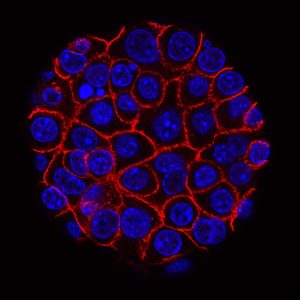
AstraZeneca’s Tagrisso gets EU lung cancer sign-off
pharmafile | February 4, 2016 | News story | Sales and Marketing | AstraZeneca, European Commission, NSCLC, Tagrisso, non-small cell lung cancer, osimertinib
The European Commission (EC) has granted conditional marketing authorisation to AstraZeneca’s Tagrisso to treat locally advanced or metastatic non-small cell lung cancer (NSCLC) that tests positive a specific mutation.
Tagrisso (AZD9291, osimertinib) is the first medicine indicated for patients with epidermal growth factor receptor (EGFR) T790M mutation-positive NSCLC. Mutations in the EGFR receptor can lead to uncontrolled cell growth and tumour formation.
Tagrisso targets both the EGFR mutation that triggers cancer development and T790M, a mutation that makes tumours resistant to existing treatments- an important factor, since nearly two thirds of patients with NSCLC whose disease progresses after treatment with an EGFR inhibitor develop the T790M mutation, for which treatment options are currently limited. Conditional marketing authorisation is given in such areas of unmet need with less complete trial data than usual, and the drug’s status can then be reviewed as more data becomes available.
Dr Matthew Peters, chair of the Global Lung Cancer Coalition, welcomed the increasingly personalised approach to treatment becoming available to lung cancer patients, as a result of improved diagnostics: “It is an exciting time in the care of patients with lung cancer,” he says. “The ability to precisely characterise patients who have different types of lung cancer based on genetic mutations, and predict their response to targeted treatments, offers a more accurate and efficient approach to lung cancer care.
“Patients with common sensitising EGFR mutations and the separate T790M have disappointing responses to standard treatments. Testing for the T790M status of lung cancer patients, using either a tumour sample or a simple blood test, and directing patients towards a medication such as osimertinib that is specifically designed for their pattern of mutations, offers greater prospects for durable treatment outcomes.”
The EU approved Tagrisso based on data from two Phase II studies (AURA extension and AURA2) and the AURA Phase I expansion study, which demonstrated efficacy in 474 patients with EGFRm T790M NSCLC who had progressed on or after an EGFR-TKI. In the combined Phase II studies, the objective response rate was 66%, and progression-free survival (PFS) was 9.7 months.
Sean Bohen, executive vice president, Global Medicines Development and chief medical officer at AstraZeneca, says: “Osimertinib defines a new generation of targeted EGFR-TKI treatments, and the European Commission’s expedited approval reflects the importance of this innovative medicine for addressing the needs of patients with lung cancer who have the T790M mutation. We are now building on our understanding of the clinical activity of osimertinib to explore its full potential in patients with EGFRm lung cancer in multiple treatment settings.”
The EU marketing authorisation was approved through the Accelerated Assessment procedure of the European Medicines Agency (EMA). This approval follows US Accelerated Approval granted in November 2015 and availability in the UK under the Early Access to Medicines Scheme in December 2015. In Japan, osimertinib was granted Priority Review by the Pharmaceuticals and Medical Devices Agency (PMDA).
Joel Levy
Related Content

AstraZeneca shares results for Imfinzi in phase 3 trial for small cell lung cancer
AstraZeneca has announced positive high-level results from the phase 3 ADRIATIC trial, which demonstrated that …

FDA accepts BLA for AstraZeneca and Daiichi Sankyo’s datopotamab deruxtecan for breast cancer treatment
AstraZeneca and Daiichi Sankyo have announced that their Biologics License Application (BLA) for datopotamab deruxtecan …

FDA approves AstraZeneca’s Ultomiris for NMOSD treatment
AstraZeneca has announced that the US Food and Drug Administration (FDA) has approved Ultomiris (ravulizumab-cwvs) …








